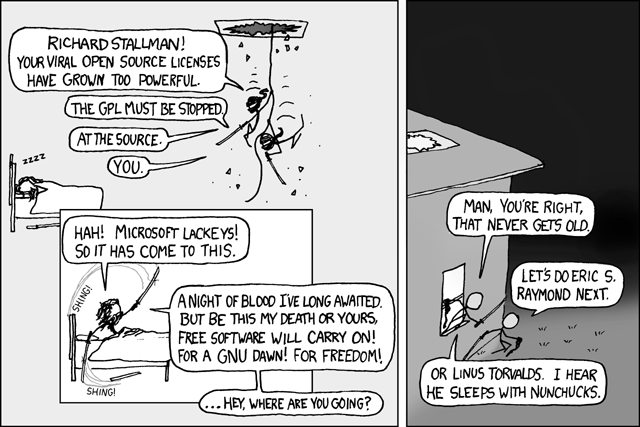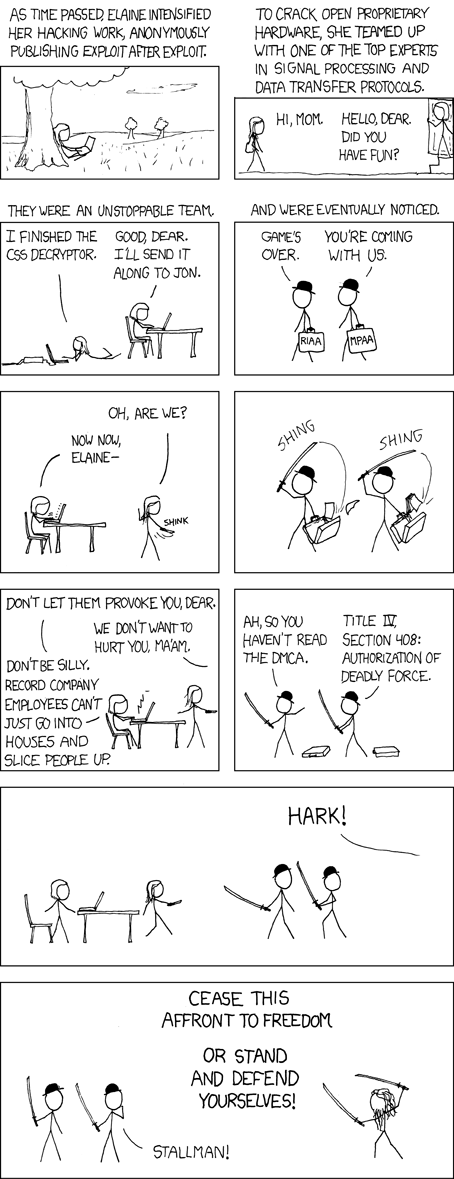Did I mention that I have become quite a fan of xkcd.
humour
xkcd is great
I’m probably late to this and you have probably already heard about it. Anyway its an online comic called xkcd and its great. At first glance I thought, well, stick figures ain’t exactly impressive. But then once you read a few of them you quickly develop an appreciation for the humour in them. Particularly if you know, for example, what sudo means.
And its also educational. To wit, the third row of one of the more recent strips, reproduced below for your reading pleasure. Somewhat tech legal related. Least enough for me. And no, I have no idea how to pronounce xkcd other than saying the letters.
innovative uses for iphones
I don’t know what’s better – Apple’s remarkable marketing abilities or the endless spoofs they generate, of which this SNL sketch (on Gizmodo) is one of the more recent examples. Reminds me of another one by Dave Chappelle that can be found on Youtube. Which I probabably won’t link to. Anyway. Watch. Enjoy.
Now back to work…
a rose by any other name…
or, a study on the idea/expression dichotomy in copyright law as illustrated through flatulent dolls. The interesting decision in JCW Investments v. Novelty, Inc. centers around how copyright can inhere in toy farting dolls:
Somewhat to our surprise, it turns out that there is a niche market for farting dolls, and it is quite lucrative. Tekky Toys, an Illinois corporation, designs and sells a whole line of them. Fred was just the beginning. Fred’s creators, Jamie Wirt and Geoff Bevington, began working on Fred in 1997, and had a finished doll in 1999. They applied for a copyright registration on Fred as a “plush toy with sound,” and received a certificate of copyright on February 5, 2001; later, they assigned the certificate to Tekky. In the meantime, Tekky sent out its first Fred dolls to distributors in 1999. By the time this case arose, in addition to Fred, Tekky’s line of farting plush toys had expanded to Pull My Finger® Frankie (Fred’s blonde, motorcycle-riding cousin), Santa, Freddy Jr., Count Fartula (purple, like the Count on Sesame Street), and Fat Bastard (character licensed from New Line Cinema’s“Austin Powers” movies), among others. By March 2004, Tekky had sold more than 400,000 farting dolls.
400,000! Anyway, on to the actual law part of it. Basically, another company, Novelty, came along and developed a similar doll and the court found them offside:
It is not the idea of a farting, crude man that is protected, but this particular embodiment of that concept. Novelty could have created another plush doll of a middle-aged farting man that would seem nothing like Fred. He could, for example, have a blond mullet and wear flannel, have a nose that is drawn on rather than protruding substantially from the rest of the head, be standing rather than ensconced in an arm-chair, and be wearing shorts rather than blue pants.
Well. Good to know that one can’t own the idea of a farting, crude man – only the particular expression of a farting, crude man.
There was of course also the trademark aspect to it:
The jury found Novelty liable for trademark infringement because Novelty used the words “Pull My Finger” to sell its farting Santa dolls, and this use infringed Novelty’s mark for those words as related to plush dolls.
There you have it. “Pull My Finger” is a trademark.
directions please
Someone posted this over at TorCamp. Just some directions on Google to get to London. Step 26 is a bit tricky, ‘specially with the car…
Why I Love the Brits
As history has clearly demonstrated, the British have no equals when it comes to keen and slightly caustic humour. At the risk of testing the limits of fair use, I excerpt some rather large chunks below from a brilliant article in the Guardian Unlimited about the British version of the Mac ads – I’m sure you’ve seen them (at least the US ones) – the ones with a rather geeky fellow being the poor PC, with the rather cool looking dude being the Mac. Well, one Mr. Brooker had this to say in response:
I hate Macs. I have always hated Macs. I hate people who use Macs. I even hate people who don’t use Macs but sometimes wish they did. Macs are glorified Fisher-Price activity centres for adults; computers for scaredy cats too nervous to learn how proper computers work; computers for people who earnestly believe in feng shui.
PCs are the ramshackle computers of the people. You can build your own from scratch, then customise it into oblivion. Sometimes you have to slap it to make it work properly, just like the Tardis (Doctor Who, incidentally, would definitely use a PC). PCs have charm; Macs ooze pretension. When I sit down to use a Mac, the first thing I think is, “I hate Macs”, and then I think, “Why has this rubbish aspirational ornament only got one mouse button?” Losing that second mouse button feels like losing a limb. If the ads were really honest, Webb would be standing there with one arm, struggling to open a packet of peanuts while Mitchell effortlessly tore his apart with both hands. But then, if the ads were really honest, Webb would be dressed in unbelievably po-faced avant-garde clothing with a gigantic glowing apple on his back. And instead of conducting a proper conversation, he would be repeatedly congratulating himself for looking so cool, and banging on about how he was going to use his new laptop to write a novel, without ever getting round to doing it, like a mediocre idiot.
Cue 10 years of nasal bleating from Mac-likers who profess to like Macs not because they are fashionable, but because “they are just better”. Mac owners often sneer that kind of defence back at you when you mock their silly, posturing contraptions, because in doing so, you have inadvertently put your finger on the dark fear haunting their feeble, quivering soul – that in some sense, they are a superficial semi-person assembled from packaging; an infinitely sad, second-rate replicant who doesn’t really know what they are doing here, but feels vaguely significant and creative each time they gaze at their sleek designer machine. And the more deftly constructed and wittily argued their defence, the more terrified and wounded they secretly are.
Ouch! And, skipping ahead to the finish:
Ultimately the campaign’s biggest flaw is that it perpetuates the notion that consumers somehow “define themselves” with the technology they choose. If you truly believe you need to pick a mobile phone that “says something” about your personality, don’t bother. You don’t have a personality. A mental illness, maybe – but not a personality. Of course, that hasn’t stopped me slagging off Mac owners, with a series of sweeping generalisations, for the past 900 words, but that is what the ads do to PCs. Besides, that’s what we PC owners are like – unreliable, idiosyncratic and gleefully unfair. And if you’ll excuse me now, I feel an unexpected crash coming.
I have just finished erecting a small miniature shrine in honour of Mr. Brooker. Bravo, sir. Bravo.
Celebrity Patents!
This comes by way of Engadget. In short, an interesting story about a bunch of patents filed by celebrities. Some of them are interesting, but not that surprising (e.g. Eddie Van Halen creating a support for a guitar). Others, though, leave me scratching my head. Like these:
- 2. Zeppo Marx, Actor/Comedian Patent #3,473,526 — Cardiac pulse rate monitor
- 4. Penn Jillette, Magician. Patent #5,920,923 — Hydro-therapeutic stimulator (for, um, sexual stimulation)
- 9. Lawrence Welk, Musician/Bandleader. Patent #D170,898 — Welk ash tray (design)
- 13. Hedy Lamarr, Actress. Patent #2,292,387 — Secret communication system
Makes you wonder, doesn’t it?
Kinderstart v. Google
Speaking of litigation, here’s another one, albeit rather old news. The short version: Kinderstart, a web startup focused on children, decides to sue Google because its PageRank drops when Google decides to fine tune its PageRank algorithms. PageRank, btw, is what determines where your site shows up in search results when someone searches on key terms in Google. So when your PageRank drops, less people see the link to your site, less people find your site, and therefore your traffic and revenue go down.
Because of this, they sued Google for damages and also sought an injunction to require Google to reveal their proprietary PageRank algorithms (which of course Google closely guards as a trade secret.
As with the Culligan case, yes, well written decision, etc. etc., and I understand the logic and all that, but there’s a little part of me that wishes that the court could have written a judgement like this:
Kinderstart, this is Google. Google is a separate business from yours. They don’t owe you a living. So, in response to your claim, the answer is no. Now go away.
Tip o’ the hat to the Stella Awards for mentioning this in their listserv. Highly recommended for their take on US litigation.
Venture Capital Valuations
OK I lied – just a few quick posts since its been so long and I need a break from drafting.
For all of you out there looking to value your 2.0 startups go take a look at Bubbleprice. An amazingly sophisticated set of proprietary algorithms developed by industry veterans allows you to input primary and secondary valuation factors used by those in the industry to give a precise indication of economic value. Fascinating, fascinating technology.
An example can be found below:
In fact, I’d be happy to take a half of that. Or a third. Even a tenth.



